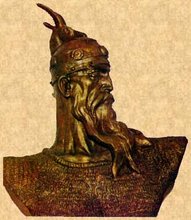There are exceptions to this, thank heavens, and the letter reproduced below is one of them. While I'm not sure what "historical links" exactly between Serbs and Jews Prof. Avineri (the writer of the letter) has in mind, the vast majority of what he has to say is an intelligent, open-minded, and above all else, realistic assessment of the Kosova situation, of Serbia's own situation, and what the best solutions for all involved likely are and will be. We need more voices like Prof. Avineri's coming out of the Jewish community to stand up for what's right and best for all involved, and further more, to do so without resorting to polemic or emotionalism. but to base what they have to say on reason, logic, and facts.
*************************************************
Letter to a Serbian friend
Dear A - I am writing this because some of my best friends are Serbs, and because of the historical links between Serbs and Jews. Some of my best friends are also Kosovar Albanians, and as Jews, who have been stateless for such a long time, many of us understand and support their quest for self-determination and independence.
This is a crucial time for Serbia, and it appears that because of a fixation on the past - revered and sacred as it may be - Serbia may be forfeiting its chance of future association with the European Union, to which by history and culture your country certainly belongs.
Let us first start with the incontrovertible facts of the present: 90% of the population of Kosovo is ethnic Albanian, and they will never willingly revert to Serbian rule, which after the annexation of Kosovo to Serbia in 1913 has been to them a continuous history of exclusion, discrimination and eventual ethnic cleansing. Nor will the democratic West accept a return of Serbian rule.
Does it mean that the Kosovar Albanians are blameless? Of course not. In ethnic conflict no side is totally right or totally wrong.
I know you view Kosovo as your Jerusalem, and this argument falls on willing ears in Israel and among Jews generally.
But if the population of Jerusalem would have been 90% Arab, the Israeli claim to it would certainly be very tenuous.
I know you have deep historical associations with Kosovo, which since the emergence of Serbian nationalism in the 19th century has been christened "the cradle of Serbian civilization."
Yet one cannot draw 21st century borders according to historical links which overlook the wishes of the present population. The question is not territory, but people. It is for this reason that most Israelis today are willing to give up claims to the historical regions of Judea and Samaria, even willing to consider Palestinian rule over parts of Jerusalem. History clashes with reality: this may be unfortunate, but one has to confront it.
I KNOW you claim that for centuries Serbia has been a bulwark of Christian Europe against Islam. I leave aside the unpleasant "clash of civilizations," if not racist overtones, of this claim. But - let's again be realistic: after all, you lost the battle of Kosovo in 1389 to the Ottomans, so you were not that successful in defending Europe against Islam (whatever this may mean).
You offer the Kosovo Albanians autonomy, not independence. Put yourself in their shoes. Was "autonomy" under Turkish rule in the 19th century sufficient for the Serbs? What's the difference?
I know all this may be very painful to you; and with some justification you may ask me: How can you call yourself a friend of the Serbs after saying all these things?
For a simple reason: I would like to see Serbia join Europe, just a Slovenia did and Croatia may in the future. Do not exclude yourself because of historical memories, do not be your own worst enemy. Do what modern nations - the French and the Germans, for example - have done after centuries of warfare: emancipate yourself from the shackles of the past, cut you loses (yes, modern nations have to do this too) and shape your future according to the values of self-determination and mutual acceptance.
And those Serbs, who would like to visit the monasteries and other historical sites in Kosovo, could do this - as today ethnic Germans visit their ancestral sites in Poland, the Czech Republic and Hungary, without laying claims to these regions because of their centuries-old associations with them.
Serbia is a proud nation. It has a bright future ahead of it. Don't let the past steal it away from you.
The writer is professor of political science at the Hebrew University of Jerusalem, and the author of a recently published intellectual biography of Theodor Herzl.




















